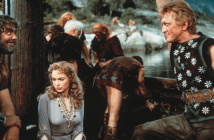Cast: Gary Oldman, Colin Firth, Tom Hardy
Director: Thomas Alfredson
Country: France | UK | Germany
Genre: Drama | Mystery | Thriller
Official Trailer: Here
For an alternate take on Tinker Tailor Soldier Spy check out Ronan’s Doyle’s review.
Tinker, Tailor, Soldier, Spy was first a complex, labyrinthine novel by John le Carre. Then it was a complex, labyrinthine miniseries on BBC TV. Now it is a lean two-hour feature where the complexity gets lost in the labyrinth. The film is masterfully crafted and beautifully acted, thoroughly cinematic in every way – except for its screenplay, which painfully compresses the story and structures the narrative as a rote procedural. The subtle, gorgeous, endlessly evocative filmmaking is more than enough to hold our interest, but this is a movie with a story to tell, and the story is so obfuscated by this script that it’s hard to maintain interest.
In terms of pure cinema, however, the film is spellbinding. Directed by Tomas Alfredson (who brought us the original Let the Right One In), Tinker, Tailor, Soldier, Spy is a meticulous slow burn of visual suggestion, dripping in atmosphere and loaded with evocative subtext in nearly every shot. Alfredson’s roots as a horror director inform his approach to suspense, even in a literary period setting. This is likely the most unsettling Cold War-era spy saga you will ever see, its gaze cold but piercing, offering leagues more intriguing information in its silences than in any of its verbose interrogation scenes. While the material retains the befuddling narrative quandary of le Carre’s work, the filmmaker seems intrinsically drawn toward the intimacy of a probing character study. He’s more preoccupied with the illuminating tics of personality than the minutiae of exposition.
It makes sense, since the central protagonist is a fascinating psychological Rorschach. George Smiley (Gary Oldman) appears slight, bland, unassuming. He listens far more often than he speaks. On the surface, he might seem like a dinosaur – a veteran British Intelligence agent forced into retirement after a botched mission in Budapest presumably results in the death of a key MI-6 agent. The longtime head of the British secret service (the “Circus”), known only as Control (John Hurt), mobilized the mission on the suspicion that a Soviet mole had infiltrated MI-6. He is dismissed upon the mission’s failure, and Smiley along with him. As they make their final walk out of headquarters, the gothic structure looms over them like the shadow they can never evade – always present, never allowing escape. Control, after years of political turmoil, approaches retirement with the weathered cynicism of a man at his end. For Smiley, however, the end is only the beginning.
Not that one would know it to look at him. Shrewd and lethally calm, Smiley carefully maintains the image of a tabula rasa – a blank slate who wouldn’t dare hint at how the gears inside his brain are turning. But as we follow him through the film, he slowly reveals the intricacy of his intelligence. Smiley is ushered out of retirement by a government minister (Simon McBurney) after a rogue agent, Ricky Tarr (Tom Hardy), delivers information that reignites the suspicion of a mole. After spending the better part of a year embracing calm silences and going on daily swims in a nearby lake, Smiley is put in charge of discovering and exposing the rat, and he does so in a fashion so methodical and deliberate it barely registers as work. He is a stoic master, unwavering at every turn.
Oldman is a master chameleon capable of playing literally any role, no matter how wild the departure. He can radically alter his appearance, he can assume any accent, and he is capable of letting the character guide his performance into radically avant-garde territory. He is so fearless that his simple, unassuming approach to the Smiley character seems almost shocking in its simplicity. But the brilliance of his performance lies in that disciplined subtlety. Smiley is a man driven by a method – the gears are turning but he never lets us see. It is ultimately a brave choice for Oldman to turn so inward. Alfredson is so fascinated by that stoicism that he allows the film’s style to function as a mirror of Smiley’s psyche – he layers the secrets within his dense visual storytelling but never openly shows his cards.
As a result, Tinker, Tailor, Soldier, Spy contains some of 2011’s most masterful filmmaking. But the screenplay, adapted by Bridget O’Connor and Peter Straughan, never shakes off the episodic feel of a meandering mini-series, even in this considerably streamlined adaptation. As Smiley engages in one lengthy interrogation after another, we are riveted by Oldman’s portrayal and Alfredson’s style, but not by the content of the interrogations themselves. Some of this, surely, is by design, but in spite of Alfredson’s keen eye on mood and character, this is a movie driven by the machinations of a very specific plot, one that should be intriguing at every turn. Instead, it drags and ultimately distracts from the more interesting visual preoccupations of Alfredson. In the end, Tinker, Tailor, Soldier, Spy needs less text and more subtext.
[notification type=”star”]65/100 ~ OKAY. Tinker, Tailor, Solider, Spy is brilliantly crafted and beautifully acted, but a compressed, labyrinthine script distracts from the otherwise masterful work.[/notification]




